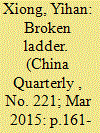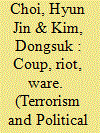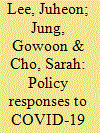| Srl | Item |
| 1 |
ID:
139550


|
|
|
|
|
| Summary/Abstract |
This paper attempts to explain why education fails to facilitate upward mobility for migrant children in China. By comparing a public school and a private migrant school in Shanghai, two mechanisms are found to underpin the reproduction of the class system: the ceiling effect, which is at work in public schools, and the counter-school culture, which prevails in private migrant schools. Both mechanisms might be understood as adaptations to the external circumstances of – and institutional discrimination against – migrants rather than as resistance to the prevailing institutional systems. Thus, the functioning of these mechanisms further strengthens the inequality embodied in the system.
|
|
|
|
|
|
|
|
|
|
|
|
|
|
|
|
| 2 |
ID:
163195


|
|
|
|
|
| Summary/Abstract |
This article explores how different types of governance systems shape different forms of political violence. We identify four governance types by combining the “institutional” dimension of coalition size represented by a minimum winning coalition (MWC) and the “ethno-political” dimension represented by the size of ethnic groups participating in the governing coalition. This study hypothesizes that (a) an exclusive system (small MWC; narrow-based ethnic coalition) is likely to engender civil war, (b) an oversized system (small MWC; broad-based ethnic coalition) is likely to generate a coup, and (c) an undersized system (large MWC; narrow-based ethnic coalition) is likely to stimulate riots or protests. Statistical analyses confirm all three hypotheses, implying that opposition groups choose alternative forms of conflict that maximize their chances of accessing power under different governance configurations. The article concludes by identifying three possible paths toward inclusive governance and suggesting that institutional reform before ethnic inclusion makes a transition toward inclusive governance far less dangerous.
|
|
|
|
|
|
|
|
|
|
|
|
|
|
|
|
| 3 |
ID:
181035


|
|
|
|
|
| Summary/Abstract |
While South Korean racism and discrimination against migrant workers and foreign brides are not new phenomenon, some early policies adopted by the central and local governments to mitigate the impact of Covid-19 have once again revealed the country’s deep-seated xenophobia. This paper focuses on three government policies – mask rationing, universal disaster relief funds, and local government subsidies – that were adopted during the first wave of coronavirus in South Korea from February until June 2020, when supplies were insufficient and the economy was most severely affected. This paper highlights the fact that government policies were based on nationality, which led to the exclusion of foreign nationals, even long-time taxpaying residents. Such institutional discrimination was blatant, considering the country’s decades-long discussion of multiculturalism. This paper points out that, as a country with a very low number of naturalized citizens, discrimination against foreign nationals not only reflects South Korea’s perceived boundaries of in-groups and out-groups, but also demonstrates the lack of a legal basis that prohibits discriminatory practices.
|
|
|
|
|
|
|
|
|
|
|
|
|
|
|
|